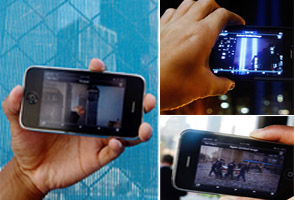Zdenek Kalal, a PhD at the University of Surrey, has developed an impressive real-time system which looks within a live camera feed for an identified object or person, then watches and learns to track that object as it rotates, moves or disappears, reappears. He demonstrates a prototype of the system in the video shown to the right.
The project won him the ICT Pioneer award and has attracted a great deal of attention from press and industry alike, as this could enable a plethora of image-tracking applications, from security systems to video stablization and control systems for the handicapped.
What is remarkable about the system is that it needs no special training (for example learning what a face is), you can simply identify an object on screen and the system will learn to track it. It looks like the stuff of science-fiction, but it’s very real. Read more on his project page.







 @
@ Tags:
Tags: 




 Like all images on the site, the topic icons are based on images used under Creative Commons or in the public domain. Originals can be found from the following links. Thanks to
Like all images on the site, the topic icons are based on images used under Creative Commons or in the public domain. Originals can be found from the following links. Thanks to